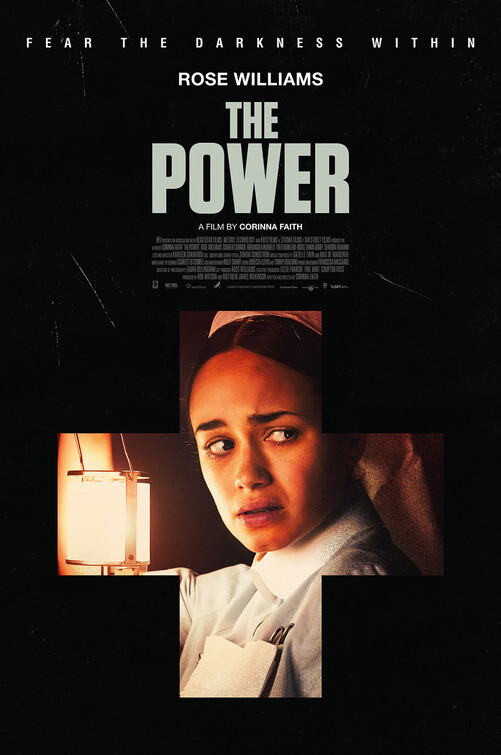I’m hugely enjoying the trope of modern horror that involves pulling real events from history as backdrops for unique and personal stories. The new film from Corinna Faith (writer of The Innocents), The Power (2021) adopts the setting of a London hospital during the 1970s power-saving blackouts. While it’s a unique pairing of genre and source material within itself, the idea of nightly nationwide power outages is, when considered, the perfect vehicle for claustrophobic intensity.
Val (Rose Williams) works her first day as a nurse and somehow finds herself forced to work the nightshift during one of the aforementioned blackouts. Simple and effective, no? Couple this setup with fantastically engrossing performances and some playful yet focused cinematography and viewers are transported within the walls of the hospital themselves. I felt Val’s every insecurity, laughed at the sardonic nurses and surmised at their odd detachment to their surroundings.
All of this made it rather more terrifying when the lights finally went out. Chills ran up my spine as the darkness crept towards Val, her whimper of “It’s too early, isn’t it?” echoing into the black. The idea of being so unprepared and in such an unfamiliar place is universal. This and the quality of direction and casting on display here bolsters an otherwise thin story requiring self-generated drama; Faith clearly knew this and rolled with it, playing to her advantages.
Every element seems tailored to add to the films immersion; the story taking place in a single night, the realistic reactions (one nurse hilariously walks away when things start to get slightly weird), the slow-burn first act that drew me in with likeable and varied characters as well as the the ambiguity of what the hell that is lurking in the dark? Then, at some point in its runtime, something happened which rarely does in modern paranormal horror; things actually escalated. While the slow realization that something is watching from the darkness is very creepy, this did not give me high hopes that The Power would elevate itself beyond the throwaway slow-build-to-jumpscare horror flick it could easily have been. Thankfully my fears were laid to rest when all implied menace finally reared its ugly head, and the true horror began.
From this enthralling tonal shift onwards we are treated to masterful setup and execution of scare after scare. Restrained and calculated use of violence serves to establish a tangible threat, forcing the viewer to relate more directly. Later on, themes are explored tastefully and mindfully that give the title a new meaning entirely, bringing a fulfilling cadence to the third act. I won’t divulge too much for the sake of impact, but the second tonal shift only added to The Power’s impression on me.
Discipline and moderation are shown in the making of this diversely spooky tale of a hospital’s dark secret. That being said, director Corinna Faith knows how to get the hairs standing and the blood pumping while still delivering a satisfying conclusion to a twisting, tightrope-walk of a horror film.
Joe first knew he wanted to write in year six after plaguing his teacher’s dreams with a harrowing story of World War prisoners and an insidious ‘book of the dead’. Clearly infatuated with horror, and wearing his influences on his sleeve, he dabbled in some smaller pieces before starting work on his condensed sci-fi epic, System Reset in 2013.Once this was published he began work on many smaller horror stories and poems in bid to harness and connect with his own fears and passions and build on his craft.
Joe is obsessed with atmosphere and aesthetic, big concepts and even bigger senses of scale, feeding on cosmic horror of the deep sea and vastness of space and the emotions these can invoke. His main fixes within the dark arts include horror films, extreme metal music and the bleakest of poetry and science fiction literature.
He holds a deep respect for plot, creative flow and the context of art, and hopes to forge deeper connections between them around filmmakers dabbling in the dark and macabre.


